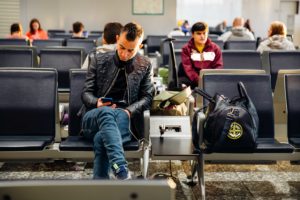Tips for Improving Personal Safety When Traveling Overseas
Making sure that you consider tips for improving personal safety when traveling overseas can make the difference between an enjoyable global excursion and a cruise nightmare. Cruising or traveling to either a new country overseas or one that you may have visited before should be a pleasant, informative, and exciting event. However, to ensure that the excitement does not take the form of danger or criminal activity, you should do a bit of advance planning and preparation. The following tips for improving personal safety when traveling overseas can help ensure that your cruise vacation is amazing.
With the high incidence of assaults, kidnappings and other criminal activity being directed at foreign travelers in some regions of the world you should prudent when traveling and follow some basic common-sense precautions. In the past, diplomats, celebrities, wealthy people, and high-ranking military personnel were a prime target for terrorists and criminals. However, in today’s world, kidnappings and assaults have been directed at members of religious groups, security personnel, cultural exchange workers, college professors, and tourists.
As part of your initial decision-making of where to go, consider the political and cultural environment in which you will be traveling and the fact that some countries have a higher incidence of crime against foreigners than others. Consult the U.S. Department of State website to determine if the country you are considering is safe for tourist travel. Another helpful source is The World Factbook that is published annually by the U.S. Central Intelligence Agency. You can also check with your local libraries, tourist bureaus, travel agents, and airlines for information about the countries that you plan to visit. When gathering information, also solicit information on items you should avoid carrying on your trip, customs requirements, and safety tips for entering, traveling in and exiting your intended countries.
Once you have done your homework, start a security checklist and ensure that you discuss your travel plans with fellow travelers (especially children who will accompany you). Also, share them with your family and friends at home. Your checklist should include many things, including what to do prior to departing for your trip until the time you plan to return. The following points should help focus your thinking on things to do in preparation for your trip. Use them to consider steps you should take and items you will need for your vacation.
Here are several tips for Improving Personal Safety When Traveling Overseas by the Cruiser At Heart
Before you travel
Any successful journey starts with a plan. Cruising is certainly no different.
- Create a personal information list and leave it with someone who would be handling affairs at home, in case of the unlikely event that something happens to you.
- Include a personal physical description and ideally leave a recent photo of yourself.
- Make sure your description includes a description of physical attributes that identify you (e.g. tattoos and scars with their location on your body, dental or medical implants, height, and weight).
- Make two color photocopies of your driver’s license, airline ticket, passport, and complete trip itinerary.
- Take one copy with you and leave the other with a trusted relative or friend.
- Before leaving home, go onto the U.S. Department of State website and register for their Smart Traveler Enrollment Program (STEP).
- Before each cruise, provide your itinerary so that the embassy or consulate in countries that you will visit is aware of your presence and can provide embassy services if needed. The site also has updated travel advisories throughout the world.
- Make note of emergency and important numbers (police, U.S. Embassy, and hotel) and carry the list with you while traveling. Give copies to everyone accompanying you in case you are separated.
- Carry a list of telephone and credit/debit card numbers with you in a safe location so that if you lose your cards you can notify your issuing companies immediately. Obviously, do not put the list in your wallet with your cards since that could be lost or stolen by a pickpocket.
Personal safety
Your safety and that of those traveling with you should never be taken for granted. Too many cruisers seem to let their guard down just because they are on vacation. Criminals will certainly not do so and will actively look for “soft targets.” These are people who seem distracted, weak, or least likely to put up resistance in the event of a robbery. They often prey on people who have a disability, are older and more unstable, or those who are not paying attention to their surroundings and belongings. This might be because they are looking at maps, taking photos, using a cell phone, or doing other things that distract them. Follow the following personal safety tips.
- If confronted by robbers; do not fight back unless personal safety is jeopardized. Give up your valuables. They are worth far less than your life and many thieves are very willing to harm victims who resist.
- Watch where you travel, avoid isolated or dimly lighted places that have few escapes routes.
- Only travel with a companion that you know and trust rather than a casual acquaintance that strikes up a conversation with you locally. Often, seemingly friendly people will try to gain your confidence and offer to take you to the “best place” for buying local products, get the best food, or see the most unique sites. These offers are often a ploy to get you away from other people where they and their waiting compatriots will rob and/or assault you.
- Be extra cautious when an overly friendly local comes up to help you interpret the language at a ticket kiosk or similar location. While they may be honestly trying to help, they might also be a professional pickpocket. Many times, such people work in teams. While one engages you in conversation, anther works to pick your pocket or steal your belongings while you are distracted.
- Walk on the outside edge of a sidewalk, near the street, rather than against a building where someone can easily attack from a doorway. This is especially true at night.
- Travel in groups when possible and remain alert about people around you and your environment.
- It should go without saying but use common sense when taking photos. Watch your footing and look out for potentially dangerous animals and locations. Many tourists die each year when they step to the edge of a high location for that perfect photo only to slip and fall over the edge. Others are killed by animals and wildlife by under-estimating potential danger and by getting too close for photographs.
Protecting your belongings
You likely worked hard for everything that you have. Make sure that your actions or inactions do not jeopardize the security of your personal belongings when traveling.
- Before leaving on your trip, get small RFID covers/carriers for each credit card and your passport. These prevent someone with a scanning device from simply standing next to you, your purse, or bag and accessing your card and passport information.
- Never place your airline tickets and passports in the front slip pocket of your carry-on bag. It is too easy for them to fall out or for someone to quickly snatch them. Instead insert them inside a zippered compartment, in a secured purse or an inside jacket pocket.
- Leave all unnecessary jewelry, credit/debit cards and valuables at home. Carry one or two major credit cards and a debit card instead of carrying around large amounts of cash. Your credit card should be a VISA or Mastercard that is free of international currency fees when possible. Many businesses overseas do not accept American Express due to high fees charged to businesses that process charges with that card.
- Carry electronic equipment, excess jewelry, and other valuables in your carry-on bag(s) or purse. Never leave your belongings on a chair or bench near a doorway on a bus, train, or in a restaurant. Otherwise, a thief can grab them and run out the door before you can react. Instead, place them between you and a wall, behind a table with reduced access from people in surrounding tables or people walking by.
- Secure your luggage with a TSA approved lock. Many people also use one or two TSA-accessible combination lock luggage straps around their bag(s). When using the straps, make sure to loop it through the suitcase handle to keep someone from simply sliding it off the bag to gain access.
- Ensure that you put a luggage tag with your name and contact information on the outside of your luggage. This includes your carry on, in case you forget it in the airport, taxi, or other location. Put a business card or something with your name, address and phone number inside in case the luggage is lost.
- Always get a luggage claim check for each piece of checked luggage at the airport or train station. Travel as light as possible to avoid. This prevents having to deal with large amounts of unattended luggage while you search for a means to move it at airports or need to go to a restroom or restaurant.
- Never leave valuables unattended at airports or guarded by strangers. If you must go to a restroom, take the bags with you.
- When traveling on trains, never lose sight of your bags by placing them between cars or near an exit. Stand or sit near them.
- If you are traveling on trains or subways, avoid sitting across from an exit door with your small bags (e.g. purse, shopping, or camera) on the floor beside your seat. This makes it quite simple for someone to grab your property and rush out the exit at a stop. A common practice is for someone on a train platform to quickly leap on, grab a bag at a train stop, and dart back out of the car before the door closes. This technique is often used throughout Europe. Instead, place your bag on your lap or to the inside on the seat between you and the wall or a traveling companion. If on your lap, wrap the strap around your wrist to prevent someone from snatching it quickly.
- Secure valuables that you leave in your hotel room. If available and possible, use a room safe or place electronics, purses, small carry-on bags that contain valuables, or other larger items in your large locked suitcase. In addition to the suitcase lock, secure the bag with a combination or key locked luggage strap. Better yet, use two straps that cross from top to bottom and left to right. When you leave the room, put the bag in your closet, behind a large chair, or under the bed if it will fit so that they are out of sight. This removes the temptation for cleaning and maintenance staff who enter the room while you are away. Granted, a professional thief intent of stealing your property can easily use a knife to cut the straps and slice the bag open, but some protection is better than none.
- Do not put passports, wallets, cellphones, cameras, or other such valuables in a coat pocket or purse and leave them hanging on a hook or over the back of a chair in a public place. This also pertains to the hook in toilet stalls. Someone outside can easily reach over the door, grab your items, and run out the door before you can react.
- Never carry your passport, identification card, wallet, cell phone, or other valuables in your back pocket. Pickpockets look for shapes on trousers to quickly identify potential targets.
- A good option for protecting passports, credit cards, and money is to buy an around the waist money belt that fits under clothing. Avoid ones that have a strap around the neck which is visible. In case of a robbery, this telltale sign alerts the criminal to where you have valuables. Get one that has the RFID protection to prevent someone nearby from being able to scan the contents with technology and capture credit card information.
- Women should carry shoulder bags in a secure manner (under their arm and opposite from the street side) with any zippers closed and any flaps against the body. Men (and women not carrying a purse) should place wallets, money, and valuables in various front, buttoned or zippered pockets to make access difficult and prevent having to give up all their money or valuables in case of a robbery. Criminals want a quick snatch and go in such instances.
- Avoid putting valuables in a backpack worn on your back. Turn the bag in front-facing forward Wrap your arms through the straps to prevent someone from stealing it unzipping pockets. If you must put it on your back, make sure that you have a secure bag that has two zippers on each opening and that you have small locks holding these together. While such locks can be easily defeated, a pickpocket will likely move on to an easier target rather than trying to get yours open. Another issue with backpacks is that many pickpockets in Europe will stand near tourists and literally slice the bag open from behind with a knife or razor blade so that they can access valuables. One way to prevent this if you are traveling with someone else is to have your friend or family member stand close behind you to watch your back and prevent access by a pickpocket. There are also slash-proof backpacks available for travelers. Some even have metal cables inside the straps to keep someone from cutting those and running off with your bag.

- Distribute money, wallets, and passports in various places on your body when sightseeing. This will preclude the loss of all items in the event of theft or unforeseen incident. In case of a robbery, you can give up money from one pocket and still have more left. Another trick is to carry a “dummy” wallet which has a couple of dollars in it, along with expired membership cards, or the fake marketing credit cards received in promotional mail pieces. Hand it over to a robber who will likely not take time to look inside before running off.
More Tips for Improving Personal Safety When Traveling Overseas
Lower your personal profile
One thing that you do not want to do in a foreign country is to stand out and draw attention to yourself. Consider the culture and try to dress and act like locals where appropriate. This pertains to voice, gestures, and dress.
- Dress conservatively and do not wear items readily identifying you as an American or someone who is affluent. Maintain a low profile and try to blend in with the locals related to clothing items. Keep in mind that in impoverished locations and areas of high criminal activity, even inexpensive costume jewelry (e.g. Swarovski crystals or cubic zirconias) might be mistaken for expensive items. Also, even such items are likely worth more in the country that you are visiting than they would be at home.
- Do not carry around large shopping bags, especially ones that have the name of expensive products (e.g. Apple, Nike, or Canon), a large department store, or other high-end store names on them.
- Avoid doing things that draw attention to yourself and be polite when dealing with local nationals, especially authority figures. Things like using drugs, excessive drinking excessively, and loud obnoxious behavior can get you in serious trouble. Remember that, except in cases of diplomatic immunity, the rules of the host country govern; not those of your country.
Develop situational awareness
Due to my military, law enforcement, and security background, I am always conscious of my surroundings and scan venues and people in them when I travel. The following are a few tips to consider, especially if you are traveling alone or a woman.
- Do not get into elevators with a group of people if your “gut” tells you there is something wrong. If you are a woman traveling alone, be cautious of entering an elevator alone if you are the only female.
- If you are alone, avoid dark or lonely locations, such as a deserted train or subway station platform. Even if someone is with you, be aware of your surroundings and any suspicious-looking people who might be there. If there is an emergency phone or transportation employee present, position yourself near it in case you need assistance.
- Watch for suspicious people who seem to be following or observing your moves for extended periods.
- Identify “safe havens,” such as police stations, fire stations, hospitals, and major hotels in the vicinity in case you need to flee to one. Check out YouTube videos to learn common tourist scams being used in the different locations you plan to visit and plan accordingly to prevent being a victim.
Miscellaneous considerations
- Get travel insurance that covers at least loss of personal property and medical coverage in case of injury, death, and repatriation of remains in the event of your death that of someone traveling with you.
- Avoid being overcharged by taxi drivers by asking someone at the airport or train station information desk approximately what a cab ride to your desired location should cost. Before getting in, have the cab driver give a similar estimate, even if there is a meter. Many times, once in a vehicle, drivers will tell you that it is not working so he/she can charge an escalated rate. Even if a meter is working, ask how far you are from your location and get a quote since many cab drivers will try to take you on the scenic route to raise the rate showing on the meter. In situations where no meter exists, always get a rate quote before getting in.
- Never agree to deliver packages or items from people with whom you are not thoroughly familiar. They may contain contraband and subject you to criminal prosecution.
- Deal only with authorized agents when purchasing tickets and souvenirs or exchanging money. Otherwise, you may be accused of black marketing, which is a serious crime.
- Avoid photographing military installations and personnel, police, border areas, and transportation facilities, unless permission from appropriate authorities is obtained. Since it is often difficult to determine what appropriate authority is in many countries, you are probably better off to avoid taking such photos altogether.
- Remember that many foreign hotels don’t have adequate fire prevention and detection devices. For that reason, try to book a room above the first floor (for security) and below the seventh (low enough for fire equipment to reach). Also, request a room near an emergency exit. Never use an elevator in cases of emergency exit.
By observing these simple suggestions and doing a bit of planning, you can experience one of the most interesting events of your life. You can also help ensure that the memories you bring home are fond ones. Bon Voyage!!
For additional information on ways to have the best cruise of your life, get a copy of The Complete Guide to Ocean Cruising: Everything You Need to Know for a Great Vacation.
About Cruiser at Heart
Cruiser At Heart was created and is managed by Robert (Bob) W. Lucas,  who is passionate about cruising, world travel, meeting people, and sharing information with others. He has visited, lived, and worked in over 50 countries on four continents. He and his wife, MJ, took their first cruise in 1994 and have not stopped since. He shares his travel experiences about the wonderful people and cultures he has experienced, along with tips for maximizing a cruise vacation.
who is passionate about cruising, world travel, meeting people, and sharing information with others. He has visited, lived, and worked in over 50 countries on four continents. He and his wife, MJ, took their first cruise in 1994 and have not stopped since. He shares his travel experiences about the wonderful people and cultures he has experienced, along with tips for maximizing a cruise vacation.
When not cruising, Bob is the President at Robert W. Lucas Enterprises the parent company of Success Skills Press. He is an internationally-known, award-winning author of thirty-nine books, compilations, and video training guides, and has published hundreds of articles on a variety of workplace performance, self-help, and reference topics. His latest book The Complete Guide to Ocean Cruising: Everything You Need to Know for a Great Vacation. During his career as a human resource development professional for over 4 decades, he shared his adult learning and business expertise with thousands of people from around the world. Bob has been listed in Who’s Who in the World, Who’s Who in America, and Who’s Who in the South and Southeast numerous times.



